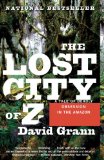Summary | Excerpt | Reviews | Beyond the Book | Readalikes | Genres & Themes | Author Bio

A Tale of Deadly Obsession in the Amazon
by David Grann
Fawcett had concluded that an ancient, highly cultured people still existed in the Brazilian Amazon and that their civilization was so old and sophisticated it would forever alter the Western view of the Americas. He had christened this lost world the City of Z. "The central place I call 'Z' - our main objective - is in a valley, about ten miles wide, and the city is on an eminence in the middle of it, approached by a barreled roadway of stone," Fawcett had stated earlier. "The houses are low and windowless, and there is a pyramidal temple."
Reporters on the dock in Hoboken, across the Hudson River from Manhattan, shouted questions, hoping to learn the location of Z. In the wake of the technological horrors of the Great War, and amid the spread of urbanization and industrialization, few events so captivated the world. One newspaper exulted, "Not since the days when Ponce de Le—n crossed the unknown Florida in search of the Waters of Perpetual Youth has a more alluring adventure been planned."
Fawcett welcomed "the fuss," as he described it in a letter to a friend, but he was careful about how he responded. He knew that his main rival, Alexander Hamilton Rice, a multimillionaire American doctor who commanded vast resources, was already entering the jungle with an unprecedented array of equipment. The prospect of Dr. Rice finding Z terrified Fawcett. Several years earlier, Fawcett had watched as a colleague from the Royal Geographical Society, Robert Falcon Scott, had set out to become the first explorer to reach the South Pole, only to discover, shortly before he froze to death, that his Norwegian rival, Roald Amundsen, had beaten him by thirty-three days. In a recent letter to the Royal Geographical Society, Fawcett wrote, "I cannot say all I know, or even be precise as to locality, for these things leak out, and there can be nothing so bitter to the pioneer as to find the crown of his work anticipated."
He was also afraid that if he released details of his route, and others attempted to find Z or rescue him, it would result in countless deaths. An expedition of fourteen hundred armed men had previously vanished in the same region. A news bulletin telegraphed around the globe declared, "Fawcett Expedition to Penetrate Land Whence None Returned." And Fawcett, who was resolved to reach the most inaccessible areas, did not intend, like other explorers, to go by boat; rather, he planned to hack straight through the jungle on foot. The Royal Geographical Society had warned that Fawcett "is about the only living geographer who could successfully attempt" such an expedition and that "it would be hopeless for any people to follow in his footsteps." Before he left England, Fawcett confided to his younger son, Brian, "If with all my experience we can't make it, there's not much hope for others."
As reporters clamored around him, Fawcett explained that only a small expedition would have any chance of survival. It would be able to live off the land, and not pose a threat to hostile Indians. The expedition, he had stated, "will be no pampered exploration party, with an army of bearers, guides and cargo animals. Such top-heavy expeditions get nowhere; they linger on the fringe of civilization and bask in publicity. Where the real wilds start, bearers are not to be had anyway, for fear of the savages. Animals cannot be taken because of lack of pasture and the attack of insects and bats. There are no guides, for no one knows the country. It is a matter of cutting equipment to the absolute minimum, carrying it all oneself, and trusting that one will be able to exist by making friends with the various tribes one meets." He now added, "We will have to suffer every form of exposure. We will have to achieve a nervous and mental resistance, as well as physical, as men under these conditions are often broken by their minds succumbing before their bodies."
Fawcett had chosen only two people to go with him: his twenty-one-year-old son, Jack, and Jack's best friend, Raleigh Rimell. Although they had never been on an expedition, Fawcett believed that they were ideal for the mission: tough, loyal, and, because they were so close, unlikely, after months of isolation and suffering, "to harass and persecute each other"-or, as was common on such expeditions, to mutiny. Jack was, as his brother Brian put it, "the reflection of his father": tall, frighteningly fit, and ascetic. Neither he nor his father smoked cigarettes or drank. Brian noted that Jack's "six feet three inches were sheer bone and muscle, and the three chief agents of bodily degeneration-alcohol, tobacco and loose living-were revolting to him." Colonel Fawcett, who followed a strict Victorian code, put it slightly differently: "He is absolutely virgin in mind and body."
Excerpted from The Lost City of Z by David Grann Copyright © 2009 by David Grann. Excerpted by permission of Doubleday, a division of Random House, Inc. All rights reserved. No part of this excerpt may be reproduced or reprinted without permission in writing from the publisher.
Your guide toexceptional books
BookBrowse seeks out and recommends the best in contemporary fiction and nonfiction—books that not only engage and entertain but also deepen our understanding of ourselves and the world around us.